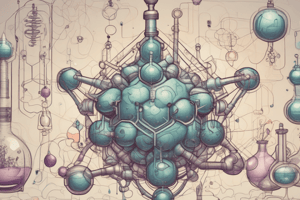Podcast
Questions and Answers
Which of the following is a characteristic of organic compounds?
Which of the following is a characteristic of organic compounds?
- High melting point
- Soluble in water (correct)
- High boiling point
- Non-flammable
What is the main difference between organic compounds and inorganic compounds?
What is the main difference between organic compounds and inorganic compounds?
- Organic compounds have covalent bonding, while inorganic compounds have ionic bonding. (correct)
- Organic compounds are flammable, while inorganic compounds are non-flammable.
- Organic compounds have low boiling points, while inorganic compounds have high boiling points.
- Organic compounds are soluble in water, while inorganic compounds are soluble in non-polar solvents.
What is the main focus of organic chemistry?
What is the main focus of organic chemistry?
- Investigating the properties of organic compounds
- Analyzing the structures of organic compounds (correct)
- Studying the properties of inorganic compounds
- Exploring the reactions of inorganic compounds
Which of the following is NOT included in the scope of organic chemistry?
Which of the following is NOT included in the scope of organic chemistry?
Which of the following is a learning outcome of the unit?
Which of the following is a learning outcome of the unit?
Which of the following is NOT a component of the study of organic chemistry?
Which of the following is NOT a component of the study of organic chemistry?
What type of compounds are hydrocarbons?
What type of compounds are hydrocarbons?
What is the focus of organometallic chemistry?
What is the focus of organometallic chemistry?
What is the purpose of studying organic reactions?
What is the purpose of studying organic reactions?
Which elements are commonly found in organic compounds?
Which elements are commonly found in organic compounds?
Flashcards are hidden until you start studying
Study Notes
Characteristics of Organic Compounds
- Organic compounds primarily contain carbon atoms, often in combination with hydrogen, oxygen, nitrogen, sulfur, or phosphorus.
- Typically formed by covalent bonds, giving them diverse structures and functional groups.
- Can occur in various forms, including hydrocarbons, alcohols, acids, and polymers.
Main Difference Between Organic and Inorganic Compounds
- Organic compounds contain carbon-hydrogen (C-H) bonds, while inorganic compounds generally do not contain carbon or, if present, lack C-H bonds.
- Organic compounds are often associated with living organisms, while inorganic compounds mostly encompass minerals and metals.
Focus of Organic Chemistry
- Organic chemistry concentrates on the structure, properties, composition, reactions, and synthesis of carbon-containing compounds.
- It examines how organic molecules interact and convert into other molecules through various reactions.
Scope of Organic Chemistry
- Organic chemistry covers a wide range of topics, including aliphatic compounds, aromatic compounds, and their derivatives.
- Inorganic compounds and their properties are typically excluded from the study of organic chemistry.
Learning Outcomes of the Unit
- Students will gain an understanding of fundamental concepts of organic chemistry, including reaction mechanisms and synthesis techniques.
- Ability to identify and classify organic compounds based on their functional groups and reactivity.
Components of the Study of Organic Chemistry
- Study of reaction mechanisms, synthesis strategies, spectroscopy, and functional group transformations.
- Typically does not include heavy metal chemistry or mineralogy, which falls under inorganic chemistry.
Hydrocarbons
- Hydrocarbons are organic compounds consisting entirely of hydrogen and carbon.
- They are categorized into aliphatic (alkanes, alkenes, alkynes) and aromatic compounds based on their structure and bonding.
Focus of Organometallic Chemistry
- Organometallic chemistry studies compounds containing carbon-metal bonds, crucial for catalysis and materials science.
- Emphasizes the role of metal ions in organic reactions and the reactivity of organometallic compounds.
Purpose of Studying Organic Reactions
- Understanding organic reactions helps predict product formation and mechanistic pathways.
- Focuses on developing new synthetic methods and applications in pharmaceuticals, agriculture, and materials science.
Common Elements Found in Organic Compounds
- Major elements include carbon (C), hydrogen (H), oxygen (O), nitrogen (N), sulfur (S), and phosphorus (P).
- These elements form the backbone and functional groups that define organic chemistry and its applications.
Studying That Suits You
Use AI to generate personalized quizzes and flashcards to suit your learning preferences.




